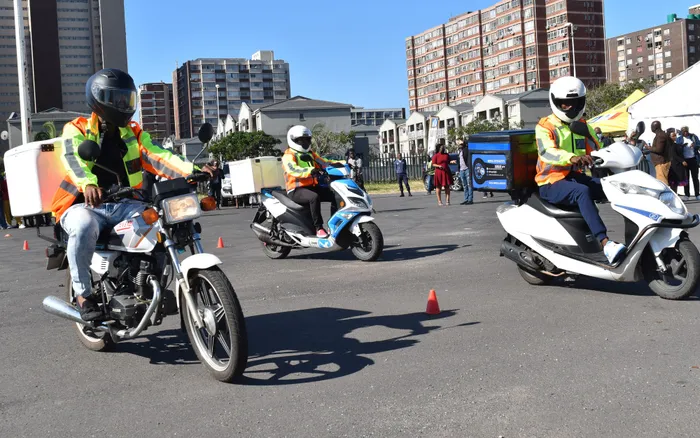SA's Biker delivery boom | How food delivery apps are transforming township economies

Food delivery apps like Uber Eats and Mr D are transforming township economies — creating jobs, reshaping local businesses, introducing new competition for vendors, and inspiring bold ventures like DJ Sbu’s Mzake’s Kitchen.
Image: Tumi Pakkies/IndependentNewspapers
Food delivery platforms like Uber Eats, Mr Delivery (Mr D), and Checkers Sixty60 have traditionally thrived in urban centers, but their expansion into townships and peri-urban areas marks a pivotal moment in the evolution of digital commerce and service access.
As these platforms penetrate new markets, they’re not only changing the way people eat but also reshaping local economies, job creation, and entrepreneurial pathways.
However, the transition is not without challenges and consequences, particularly for small vendors and community businesses.
Townships represent a vibrant and growing market. With millions of residents, increasing smartphone penetration, and a growing appetite for convenience, food delivery services have started targeting these areas with tailored solutions such as affordable menu options, simplified app navigation, and cash-on-delivery features. For companies like Uber Eats and Mr D, this isn’t just expansion, it's localisation.
Uber Eats, for example, is one year into a three-year, R200 million partnership with the Gauteng Department of Economic Development to unlock the potential of township economies. The initiative aims to onboard 2,000 delivery drivers and 700 local restaurants onto the platform.
“Our focus is on sustainable impact—offering township-based merchants tailored onboarding, subsidised hardware, and ongoing account support,” said a company representative.
“We’re also working to lower entry barriers for young people in delivery work by providing access to vehicles, training, and mentorship.
“This is a long-term investment in job creation, economic inclusion, and community transformation—powered by technology."
Professor Jannie Rossouw from the Wits School of Business told IOL that this expansion comes with ripple effects.
“Delivery services in townships can outcrowd local township shops if they can deliver at better prices,” Rossouw said.
“Businesses in townships with high profit markups stand to lose the most, as the prices charged by delivery services will undercut them.” In other words, while access and variety may improve for consumers, some local joints, independent restaurants, or spaza shops could find themselves edged out of the market if they can’t compete with app-driven pricing.
This sentiment is echoed by Freddy Mahhumane, CEO of KasiD, a local food delivery service. He noted that high commission fees from established delivery companies can be a barrier for informal food vendors in townships, making it difficult for them to compete.
There’s no doubt that food delivery platforms have introduced new employment streams for township and peri-urban youth.
Riders working in flexible, gig-based roles can now generate income quickly, often with minimal barriers to entry.
Rossouw acknowledges the potential: “Yes, new jobs will be created, but some current jobs for instance, where township shops close owing to competition might be in jeopardy.”
As for the broader employment picture, gig work provides temporary relief and income in areas with sky-high youth unemployment. Still, it's not a long-term solution for systemic job creation or economic equity.
“People employed by delivery services probably live in peri-urban communities. This will improve employment and income levels,” he adds.
While the platform economy has the potential to uplift communities, it could also deepen inequality. Small vendors without smartphones, internet access, or proper business registration may find themselves excluded from these opportunities entirely.
Rossouw warns, “These are risks for small vendors. In addition, small vendors cannot reach the level of economies of scale of big vendors in deliveries.” This digital exclusion highlights the need for inclusive tech education, infrastructure investment, and support systems to ensure that township economies are not just markets, but also beneficiaries of this digital shift.
There are also social concerns linked to the behavior of delivery drivers. Increasingly, community members have raised issues about reckless motorbike riding in township streets, often by drivers wearing branded uniforms tied to big-name vendors.
“Vendors using delivery drivers should be careful to make sure that such drivers do not damage their brand image,” says Rossouw.
As tech disrupts the township economy, some local entrepreneurs are already riding the wave. IOL previously reported that Radio personality and serial entrepreneur DJ Sbu (Sbusiso Leope) has launched Mzake’s Kitchen, a delivery-only eatery focused on traditional African cuisine.
The virtual restaurant will go live in Johannesburg over the Easter weekend exclusively on Uber Eats. The online kitchen represents a new kind of culinary business: one built from the ground up for the digital consumer.
Alongside this launch, DJ Sbu has opened franchising opportunities to encourage township-based entrepreneurs to take part in the growth.
“The level of unemployment in the country is alarming, and many young people are looking for opportunities. Mzake’s Kitchen and MoFaya are about creating those opportunities. Young people can sell our products, earn money, and gain financial freedom,” DJ Sbu told Daily Sun.
Mzake’s Kitchen positions itself at the crossroads of culture and commerce, offering authentic African meals through a modern, tech-driven delivery experience. It’s more than a restaurant, it’s a blueprint for how township food entrepreneurs can innovate and scale in the digital era.
hope.ntanzi@iol.co.za
Get your news on the go, click here to join the IOL News WhatsApp channel.
IOL News
